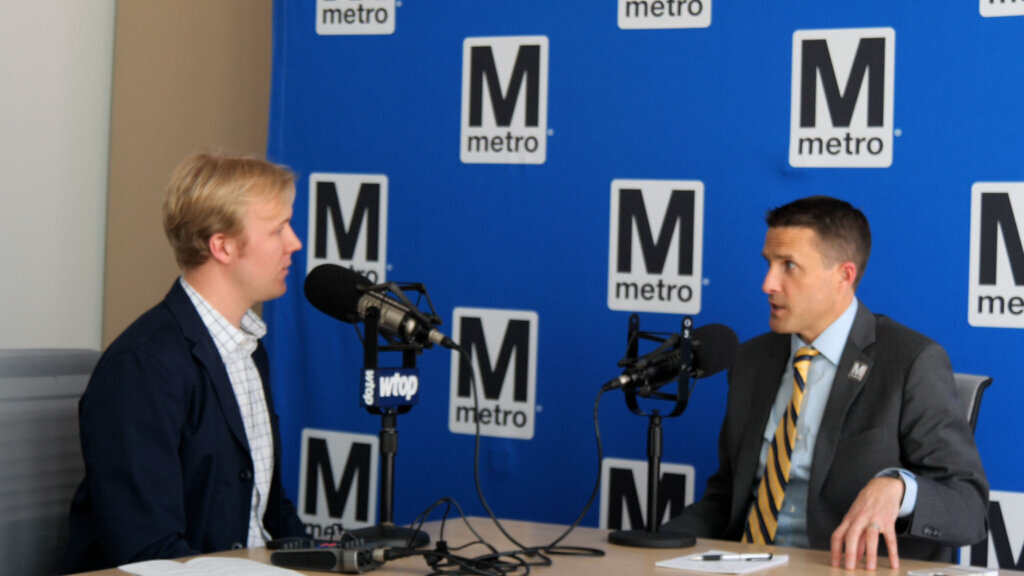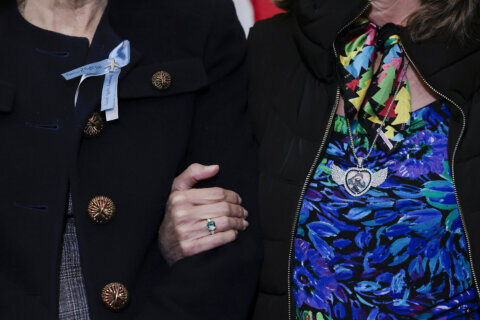
For the last few years, fare evasion in D.C. has been a proverbial thorn in Metro’s side.
“We need to gain control of the system back and we’ve got to bring a sense of orderliness,” Metro CEO and General Manager Randy Clarke said on WTOP’s DMV Download podcast. “And we’ve got to get that revenue as well.”
For Clarke, who has been on the job for nine months, fare evasion is also about safety.
“Not everyone that fare evades commits criminal activity on our system,” he said. “But, almost universally … 99.9% of people that commit criminal acts in our system fare evade.”
Clarke believes that stopping fare-gate jumpers will also limit violence on Metro.
“No one is tapping in so we know who they are, and then going downstairs with a gun and assaulting someone,” he said.
Back in November, Metro started to crack down on fare evasion by upping enforcement and handing out fines to gate hoppers. But the penalties differed depending on the location.
In Maryland and Virginia, it’s a criminal offense to evade fares. If caught, a gate-jumper gets a $100 fine and a citation. But in D.C., fare jumpers get a $50 civil fine.
The difference stems from the D.C. Council’s 2018 decriminalization of fare evasion, which argued the criminal penalty disproportionately affected Black people.
While Clarke said he appreciates the intent behind the decriminalization law, he said it gets in the way of keeping Metro riders safe.
For instance, when someone fare evades in Maryland or Virginia, Metro Transit Police is able to ask the person for identification. But in the District, officers can’t do this because fare evasion is only a civil offense.
Clarke said this ability to identify fare evaders is key to keeping dangerous people from getting onto Metro trains and buses. Clarke said he saw this happen on a recent visit to the Ballston Metro station.
“A guy fare evaded, police got him,” Clarke said. “They ran his background and he had two outstanding assault warrants.
“So then he got arrested. Not because he fare evaded, but because he also had two outstanding, violent criminal warrants. We don’t do that in D.C. because, in the D.C. law, we’re not allowed to check the same way.”
Clarke clarified that he doesn’t support criminalizing fare evasion in the District. Instead, he wants his agency’s police force to be able to identify violent criminals.
“I’m not worrying about the person not paying two bucks as much as the person not paying two bucks that also has an illegal weapon, that’s hurting people and is wanted on warrants,” Clarke said. “I can’t comprehend anyone who would be against that — we want those people off the system.”
D.C. Council member and Chair of the Public Safety and Judiciary Committee Brooke Pinto echoed Clarke’s concern.
“Decriminalizing fare evasion is a blunt instrument that has not only hurt Metro’s revenue, but has hampered law enforcement’s ability to keep all of us safe on public transportation,” Pinto said.
“I will continue to work with my colleagues to find a common-sense solution that does not needlessly entangle residents in our criminal justice system but also does not tie the hands of Metro and law enforcement.”
Pinto added that any changes to WMATA fall under the Transportation and Environment Committee headed by Council member Charles Allen.
Allen said that fare evasion has nothing to do with safety on Metro.
“This conversation around safety on Metro and fare evasion is being conflated,” the Ward 6 council member said. “And I don’t believe that’s the way that we can solve these two different problems.”
When asked specifically about whether the DC fare evasion law should change, Allen denied that the law bars police from identifying fare-gate jumpers in the District.
“Metro Transit Police or Metro employees can turn you away, can remove you from the system,” Allen said. “A law enforcement officer is always allowed to also ask for your identification. That’s something that law enforcement officers can do.”
Despite this disagreement with Clarke on fare evasion’s link to safety on Metro, Allen said he still supports Metro’s CEO.
“I think that the general manager faces a lot of pressure from other jurisdictions on their board, because there’s a pretty big fiscal cliff coming next year,” Allen said. “And he’s got some board members who are very fixated on fare evasion.”
The full interview with Metro CEO and General Manager Randy Clarke will be published on the DMV Download podcast Wednesday morning.








